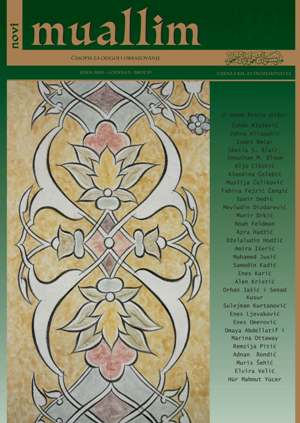MODERN REFORMATION MOVEMENTS AND THE DECLINE OF ISLAMIC CIVILIZATION
DOI:
https://doi.org/10.26340/muallim.v10i39.1403Abstract
Ebul-'Ala el-Mevdudi from the Jamat-ul-lslam of Pakistan, Hassan Al-Benna, Sayyid Muhammad Qutb from theMuslim Brotherhood Movement are among the most prominent thinkers and theoreticians of these two most important modern Islamic reform movements which, with their activities, have marked the second half of the twentieth century. In the context of causes of rise and decline of Islamic civilization many contemporary researchers often use the terms 'decadence: 'deviation' and 'renaissance' within the framework of a value system accepted, consciously or subconsciously, by the modern West which prescribes the norms and criteria for determining decadence, deviation and renaissance in a stealthy and perfidious manner, as lucidly pointed out by Seyyed Hossein Nasr in his work entitled Decadence, Deviation and Renaissance in the Context of Contemporary Islam. According to the mentioned author, a general error occurs by ignoring the objective, transcendent and immutable Islamic norms which can enable someone to judge, from an Islamic point of view, when a certain form, activity or a period of human life is decadent or deviant or has the markings of a true renaissance. In his observation Nasr emphasizes that without the absolute the relative cannot be completely understood; without the immutable the flow of change cannot be evaluated. The thinkers whose ideas about the causes of rise and decline of Islamic civilization are discussed here are employing precisely the method which is advocated by Nasr and which is deficient among the modernist authors.
Downloads
Published
How to Cite
Issue
Section
License
Naknada:
a. Časopis ne naplaćuje naknadu za obradu članaka (APC) i naknadu za podnošenje članaka.
Autori koji objavljuju u ovom časopisu pristaju na sljedeće uvijete:
- Autori zadržavaju autorska prava i pružaju časopisu pravo prvog objavljivanja, pri čemu će rad jednu godinu po objavljivanju biti podložan licenci Creative Commons imenovanje koja omogućuje drugima da dijele rad uz uvijet navođenja autorstva i izvornog objavljivanja u ovom časopisu.
- Autori mogu izraditi zasebne, ugovorne aranžmane za ne-ekskluzivnu distribuciju rada objavljenog u časopisu (npr. postavljanje u institucionalni repozitorij ili objavljivanje u knjizi), uz navođenje da je rad izvorno objavljen u ovom časopisu.


